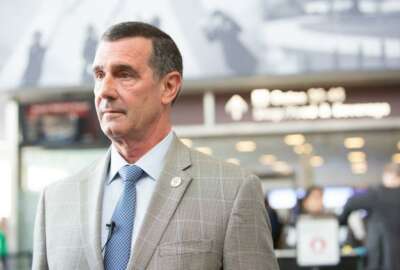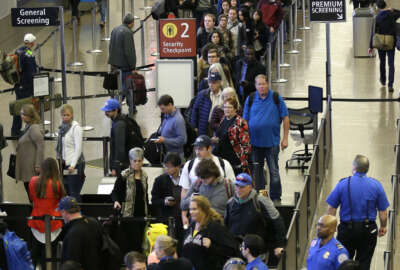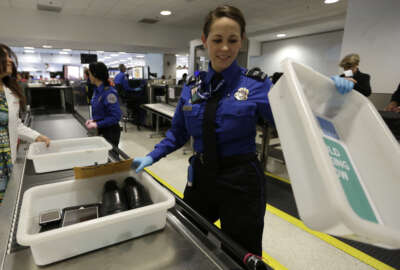
Lawmakers may sue for subpoenaed documents, committee warns TSA
TSA Administrator David Pekoske managed to mostly reassure lawmakers, with one major exception: they aren't pleased about the agency's decision to redact certain...
Transportation Security Administrator David Pekoske managed to reassure the House Oversight and Government Reform committee that TSA is in good hands, with one major exception. The committee is not pleased that TSA has refused to turn over certain documents subpoenaed as part of the investigation, and those that the agency did turn over were redacted.
Multiple times, Pekoske told the committee during the Sept. 26 hearing that he was acting under “guidance from the executive branch,” referring to directives from the Homeland Security Department’s Office of General Counsel. According to the organizational structure, he said, the DHS OGC is the direct supervisor of TSA’s general counsel.
But the committee was having none of that.
“The House of Representatives derives it’s authority from the U.S. Constitution, and is bound only by the privileges derived therefrom,” said committee Chairman Trey Gowdy (R-S.C.). “This committee does not, nor does the House of Representatives recognize purported non-disclosure privileges associated with common law. That is true even when said privileges are relevant. That was not the case here. Here, TSA sought to rely on inapplicable privileges which are, in addition to not being recognized by Congress, inapplicable. It appears, at least to this member, TSA sought to withhold this information through DHS general counsel from Congress, because TSA simply believed it could.”
Pekoske told the committee he’d made as many accommodations as he could, including sending the committee side-by-side images of the unredacted and redacted versions of the documents. But the committee insisted that wasn’t good enough, that only the documents themselves would satisfy the terms of the subpoena.
Rep. Stacey Plaskett (D-N.Y.) suggested that, should TSA continue to follow DHS’ guidance rather than turning over the documents, the committee’s next step could be a lawsuit. Again, Pekoske promised to do what he could.
Aside from a handful of contentious exchanges over the documents, the committee otherwise seemed satisfied with Pekoske’s answers. He directly addressed the agency’s recent history of low morale, misconduct among executives, and whistleblower retaliation.
Regarding the morale, he said he’s made a point of spending more time in the field engaged with TSA’s front line employees than he has at headquarters since he took office.
“[Morale] is one of the most important things that I do,” Pekoske told reporters during a recess. “I view my job as enabling my employees to do their job. They’ve got a tough job to do, and they need to know that their top leader understands it and is working hard to help them perform their job.”
Toward that end, he told the committee that he’s sat down with employees in the field, with TSA’s Office of Special Counsel, and with unions that represent TSA employees, including the American Federation of Government Employees. He’s heard their concerns, and he’s working to put in place processes and procedures to ensure the misconduct of the past is not repeated.
He told reporters that he’s already issued a number of management directives toward that end.
He also said he’s instituted hotlines and training designed to empower employees to come forward and report waste, fraud, abuse or other misconduct.
“To me, if an employee has an idea, or a better way of doing business, or sees waste, fraud and abuse, or sees abuse of authority, I want to know about it,” Pekoske said. “And I want to create an environment within TSA where they feel comfortable in providing that information. It’s against the law to retaliate. I think we need to keep on enforcing that. I don’t tolerate retaliation at all. I think it creates a very bad environment, and it’s against the law.”
He also assured the committee that no involuntary directed reassignments, one of the main ways executives had retaliated against whistleblowers, have occurred at TSA since 2015. While it is still a tool that remains at TSA’s disposal, a strict oversight process now exists to ensure that it isn’t abused.
But there are indications that that bad environment already exists at TSA. A Sept. 25 report released by the committee said the agency has suffered under an attrition rate of more than 20 percent in some certain parts of the workforce, and the Partnership for Public Service’s 2017 Best Places to Work rankings rated TSA as 336 out of 339 agency subcomponents. The only agencies that ranked lower were the Education Department’s Office for Civil Rights, the Commerce Department’s National Technical Information Service and the Secret Service.
Encouraging reporting through training and hotlines and making himself visible to the entirety of the agency isn’t the only measures Pekoske is taking to address this environment. He noted that the agency is reviewing the way it classifies and handles misconduct cases.
In an August report, the General Accountability Office stated it found more than 45,000 misconduct cases at TSA between 2014 and 2016. Pekoske told the committee those numbers were inflated, because TSA’s reporting system was classifying performance issues as misconduct. He said the agency is working to separate the two in order to present a more accurate picture.
He also said the agency is moving away from its general policy of automatically handling both performance and misconduct issues with discipline.
“I want to move TSA away from a discipline focused organization, where if somebody does something wrong, the first thing we think about is disciplining them, and rather move to more of a coaching or mentoring system,” Pekoske said. “My experience with our employees is that they want to do a good job, they just sometimes need some extra help in being able to perform.”
Regarding the issues of misconduct that occurred before Pekoske’s tenure at TSA, he said those cases have already been settled, though perhaps not in the way he would have chosen to handle them.
Copyright © 2025 Federal News Network. All rights reserved. This website is not intended for users located within the European Economic Area.
Daisy Thornton is Federal News Network’s digital managing editor. In addition to her editing responsibilities, she covers federal management, workforce and technology issues. She is also the commentary editor; email her your letters to the editor and pitches for contributed bylines.
Follow @dthorntonWFED





